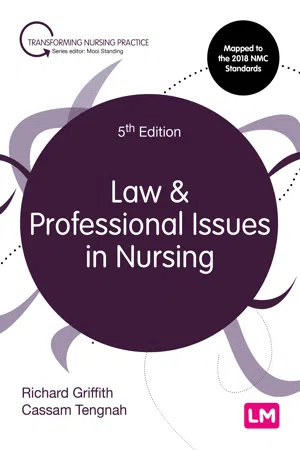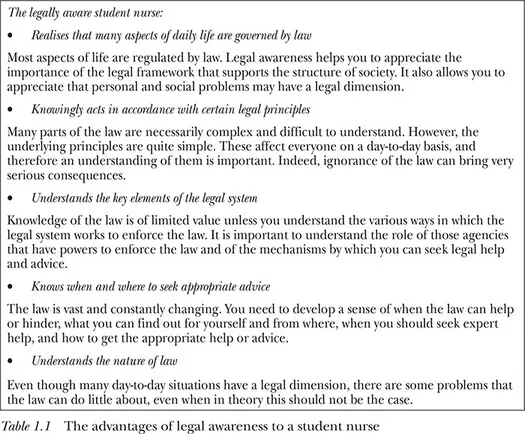
- 376 pages
- English
- ePUB (mobile friendly)
- Available on iOS & Android
Law and Professional Issues in Nursing
About This Book
Nurses are more accountable than ever to the public, patients, their employers and the profession as a whole, so it is vital you understand the legal, ethical and professional framework that underpins nursing practice.
This book provides a crash course in law for nurses, written in clear and straightforward language. It is filled with insightful case studies and interactive thought provoking activities, helping you to understand the legal obligations you will face and ensuring that you are prepared for life as a practicing nurse.
New to this edition:
·Fully mapped to the latest NMC standards of proficiency for registered nurses (2018)
·New chapter covering death, dying and organ donation
·Updated to take account of the Deprivation of Liberty Act
·New content covering GDPR, Social Media and Safeguarding of Adults and Children
Frequently asked questions
Information
Chapter 1 Introduction to law in nursing
Platform 1: Being an accountable professional
- 1.2 understand and apply relevant legal, regulatory and governance requirements, policies, and ethical frameworks, including any mandatory reporting duties, to all areas of practice, differentiating where appropriate between the devolved legislatures of the United Kingdom.
Chapter aims
- define the term ‘law’;
- identify primary and secondary sources of legal material;
- outline the role of Acts of Parliament;
- state the role of precedent at common law;
- list the key features of a published Act, statutory instrument and case report; and
- describe the relevance of law to healthcare.
Introduction

The professional practitioner
Case study 1.1 Professionalism in action
A children’s nurse who stole insulin and injected herself when she was meant to be looking after sick babies was struck off the NMC’s register and prosecuted for theft as a result of her unprofessional behaviour. The nurse fell so ill after taking the insulin that she had to be treated at the emergency department and was kept overnight for observation.(Scottish Star, 2013)
In 2018, a nurse was given an interim suspension order of 18 months with a possibility of a full striking off for stealing NHS prescription drugs and giving them to her friends. She was also given a prison sentence in 2017 for three years and eight months for theft.(Buck, 2018)
- patients were left in excrement in soiled bedclothes for lengthy periods;
- assistance was not provided with feeding for patients who could not eat without help;
- water was left out of reach;
- in spite of persistent requests for help, patients were not assisted in their toileting;
- wards and toilet facilities were left in a filthy condition;
- privacy and dignity, even in death, were denied;
- triage in A&E was undertaken by untrained staff; and
- staff treated patients and those close to them with callous indifference.
Activity 1.1 Research
Professional standards of behaviour
- your relationship with patients;
- your relationship with colleagues;
- your relationship with the profession; and
- your relationship with society generally.
Defining law
Activity 1.2 Reflection
Defining law
a rule enacted or customary in a community and recognised as commanding or forbidding certain actions.
a body of such rules.
Table of contents
- Cover
- Half Title
- Acknowledgements
- Title Page
- Copyright Page
- Contents
- Acknowledgements
- Legislation and cases
- About the authors
- Introduction
- Chapter 1 Introduction to law in nursing
- Chapter 2 Principled decision-making in nursing
- Chapter 3 Professionalism
- Chapter 4 Equality and human rights
- Chapter 5 Consent to treatment
- Chapter 6 End-of-life care
- Chapter 7 Mental health
- Chapter 8 Protecting the vulnerable adult
- Chapter 9 Consent and children
- Chapter 10 Safeguarding children
- Chapter 11 Negligence
- Chapter 12 Record-keeping
- Chapter 13 Confidentiality
- Chapter 14 Health and safety
- References
- Index